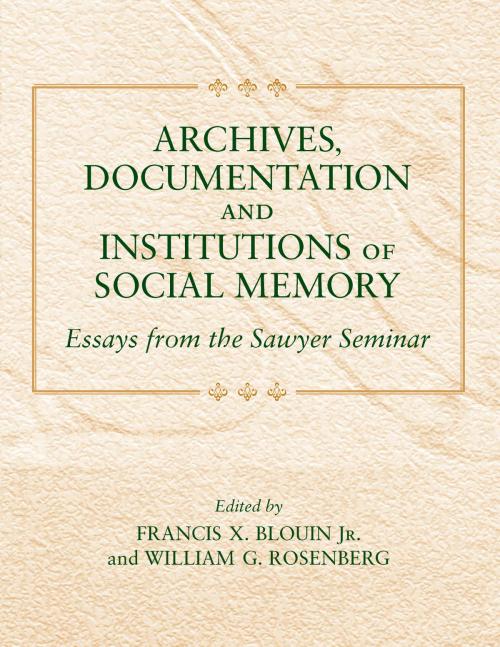Archives, Documentation, and Institutions of Social Memory
Essays from the Sawyer Seminar
Nonfiction, History, Reference, Historiography| Author: | ISBN: | 9780472026722 | |
| Publisher: | University of Michigan Press | Publication: | March 2, 2011 |
| Imprint: | University of Michigan Press | Language: | English |
| Author: | |
| ISBN: | 9780472026722 |
| Publisher: | University of Michigan Press |
| Publication: | March 2, 2011 |
| Imprint: | University of Michigan Press |
| Language: | English |
As sites of documentary preservation rooted in various national and social contexts, artifacts of culture, and places of uncovering, archives provide tangible evidence of memory for individuals, communities, and states, as well as defining memory institutionally within prevailing political systems and cultural norms. By assigning the prerogatives of record keeper to the archivist, whose acquisition policies, finding aids, and various institutionalized predilections mediate between scholarship and information, archives produce knowledge, legitimize political systems, and construct identities. Far from being mere repositories of data, archives actually embody the fragments of culture that endure as signifiers of who we are, and why. The essays in Archives, Documentation, and Institutions of Social Memory conceive of archives not simply as historical repositories but as a complex of structures, processes, and epistemologies situated at a critical point of the intersection between scholarship, cultural practices, politics, and technologies.
As sites of documentary preservation rooted in various national and social contexts, artifacts of culture, and places of uncovering, archives provide tangible evidence of memory for individuals, communities, and states, as well as defining memory institutionally within prevailing political systems and cultural norms. By assigning the prerogatives of record keeper to the archivist, whose acquisition policies, finding aids, and various institutionalized predilections mediate between scholarship and information, archives produce knowledge, legitimize political systems, and construct identities. Far from being mere repositories of data, archives actually embody the fragments of culture that endure as signifiers of who we are, and why. The essays in Archives, Documentation, and Institutions of Social Memory conceive of archives not simply as historical repositories but as a complex of structures, processes, and epistemologies situated at a critical point of the intersection between scholarship, cultural practices, politics, and technologies.















